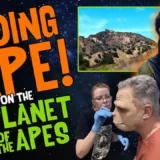
Living in space is going to be tough for so many. Modern youth might not find it cool at all. And then, having to deal with parents and grandparents who demand you live a certain way. With so many rules forced upon you, how do you live? Even worse… how do you love?
“What the eff is wrong with you!” were the first English words Lee Min Ji knew. Only, they hadn’t been spoken as eff, but the four-letter curse word that native speakers reserved for being crude and used abundantly in movies. She had grown up in the overcrowded city of Seoul, where traffic buzzed, music blared, and neighbors did not close their doors softly. They slammed them so hard, the apartments above and below rattled. Even when the neighbors weren’t slamming doors, they had filled the day and night with a constant crashing and thumping.
At age ten, Lee Min Ji encountered silence for the first time. Her father was offered a job with Eastman Chemical, which he took, and her family moved to Mars. Only a few thousand people lived on Mars, all of them working at one of twenty-five-hundred factories spewing out pollution to create an artificial ozone.
During those first few months, her family had an almost savage need to fill up the silence: shouting at each other, stomping, and slamming everything that could be slammed. Their neighbors, mostly American, Canadian, and British, had not appreciated the noise. Every night, screaming matches had erupted in the hallway. “What the eff is wrong with you?” the neighbors would shout. “What the eff is wrong with you?” her father would shout back. But the silence had always returned, oppressive and empty. That’s why she rode the train that circled Eastman’s 30,000 acres, at first with her parents, and then alone. She rode for hours, doing her homework on the hard seats, more often standing, the rattle of the train washing over her like the six years she’d been on Mars.
“What the eff is wrong with you?” Lee Min Ji said as her body swayed with the motion. She was sixteen and tall, and long black hair cascaded over her shoulders, shifting a little with every sway.
“What did you say?” A boy looked up from his touchpad.
He was maybe a year or two older. Good looking in a multicultural kind of way. A guy whose lineage was unknowable, except for his eyes. They were Asian. His accent was American.
“Nothing,” she replied dropping her eyes to her feet.
“No. You said, ‘What the eff is wrong with you?’ I heard it. Which one of us on this train insulted you? ”
As he spoke, he smiled and motioned to the empty seats. Lee Min Ji could have had her pick, but she’d chosen to stand. It was the rocking motion she wanted. It recalled to her something inexplicable that she’d left behind forever in South Korea. Her younger brother Myem Bak did not feel this. He’d been too young. And her baby sister, Lara, had been born on Mars.
“I was just thinking aloud,” she said.
The boy gave her an odd look, and then smiled. “I’m Josh.”
“I’m Lee Min Ji.” Her words came out, not in hard English syllables, but the softer, Korean ones. It sounded like eeminee. “I’m… I mean, I’m Min Ji.”
In Korea, the family name comes first. Explaining that to a westerner just resulted in a perplexed look. Explaining that her family name was her first identity and her individual name second—in her heart of hearts, she was not Min Ji surname Lee, but Lee Min Ji, and that this somehow tied her to South Korea still—was impossible.
A voice bubbled in her head. It belonged to her first teacher on Mars, Mrs. Shoemaker. “You ten boys and girls are the future. You are not your country. You are not East and West. We are Martians, the first of our kind.”
The American kids had always giggled when she had reached the Martians’ part of the speech and afterwards, they had gone around chanting, “We are Martians! We are Martians.” There had also been many jokes, often involving the color green and little men. This was before Lee Min Ji’s English was very good, but even now, she felt perplexed. There was a history in language. Every word had its own story, every idea a cultural reference. These things were somehow understood long after the meaning of the word had changed, and the exact cultural reference forgotten. She felt a sudden need to explain these things to someone, anyone. To tell the boy how isolated she was. She didn’t know why. Maybe it was his eyes, so full of good humor, and yet haunted by something. Suddenly, she knew what it was, this thing inside her. It was like children on a playground comparing the scars on their knees, telling stories about how they got each. Only her scars weren’t the kind you could see.
She felt him watching her, waiting for an answer. What had he asked while my thoughts wondered? It was beyond her memory and then it came to her.
“I was thinking about how quiet Mars is,” she replied.
He gave her another perplexed look and then his eyes widened in understanding. “You’re worried about the immigrants next year. You’re worried they’ll ruin our peaceful planet? My father says the scientists are too optimistic. Even with all the flora raising oxygen levels, it’ll be years before people can step outside without a tank.”
She almost said, “No, I want the settlers to ruin the silence. I want my father to be sent home.“ But she thought of her sister and brother, how much they’d hate Korea. How much they’d miss Mars. As much as they annoyed her sometimes, she didn’t want them to ever feel like she often did.
She said, “I haven’t seen you before. I think I know everybody.”
“On the planet? Hardly. No. My father just transferred from Exon Corp to Eastman Chemical. You guys got pretty snazzy digs. At Exon, we had one big dome instead of six small ones separated like small towns. Our oxygen levels weren’t kept up. We even had to wear our tanks in school. I have a confession. I’m just riding the train because I still get a cheap thrill out of traveling without my tank. That and just traveling. I mean it only goes in a circle, but I almost feel like I’m going somewhere and each dome is so different, it’s like… well, it’s like when I was a kid and Mom would drive us through the countryside to one of those quaint towns to buy a quilt.”
Min Ji looked out of the train’s window. They called Mars a red planet, but it had never been red, even when she had arrived those six years ago. It had been green, growing steadily greener and wilder. Carbon monoxide made green things grow, and her mother said there was something in the soil besides. Beyond the trees, the dome of Eastman Six glittered in the sun.
“Look at that!” Josh exclaimed. He pointed at a bird circling on an air current above a stand of pine trees. “How is that possible?”
“It’s not. At least not yet. They just released it. We’re passing through the country club.” As she spoke, two men dressed in camouflaged space suits rose from the tall grass and aimed their rifles. On the train, they could not hear the gun shots, but the bird tumbled from the sky.
“That’s awful,” the boy said, moving closer to Lee Min Ji.
In Seoul, personal space was non-existent, but here on Mars, she felt him pressing into her, even though he stopped half-way down the car.
She said, “It would have died anyway. Suffocated slowly. There are some pigeons that have nested up near the algae center. As long as they stay close to the tubes, they have enough oxygen to survive. Our biology class took a field trip to watch them. My teacher’s kind of crazy in love with them because nobody knows what they’re eating, and research suggests they need less oxygen than the birds from Earth. She says we’re watching evolution. My father says they’re just rats of the sky.”
“My father says we’re going to have a war,” Josh said, eyes locked on hers. He drew closer as he spoke “Not now, but in the future. Says it always happens. First, countries pay to colonize because they stand to make a lot of money, you know, from new discoveries and technology. America has all but eliminated pollution by putting the factories on Mars and Venus. But my father says when the colonies get big, they’ll go to war for independence. Think about it.” He spread his hands in the air. “The first interplanetary war. Sometimes, I find it all very exciting.”
“Sometimes, I find it all very heavy,” Lee Min Ji replied.
“I can understand that.” The boy nodded. “You know what you said about the birds. We had rats and roaches in the last compound. They came on with the food or something. Like I said, we had to carry oxygen everywhere, so we didn’t even know we had them until there were so many our dome was overrun. A roach crawled in my brother’s ear and died. He kept saying his ear hurt and finally my mother took him to a doctor.”
Min Ji shivered. “That’s gross. Why did you tell me that? Did you bring them with you?”
“No, no. I mean,” He shrugged and blushed. “I babble when I’m nervous.”
“Why would you be nervous?”
“You’re beautiful.”
She blinked and then laughed. “Didn’t they have any girls where you’re from?”
“Not many, and I’m older than most of them by a lot,” he admitted.
“Me too. I mean boys. Not girls. I’m older, you know, one of the first families on the planet.” She shrugged. “My sister, she’s five… there are tons of kids her age.”
He laughed. “All those Mars babies.” Then his face changed. He grew serious. “I get all the shows from Earth. I’ve seen lots of girls on TV. You’re still beautiful.”
Min Ji frowned, shifting uncomfortably. She felt heat rising to her cheeks. In her head, she tried on this new identity: the girl a boy liked. She discovered she was pleased. Perhaps Josh sensed this because he moved all the way up beside her, too close. They stood awkwardly, looking everywhere but at each other. Minutes seemed to pass with her heart thundering in her ears, though it was probably only a few seconds.
“Are you on Facebook?” he asked.
“Uh, yeah. But I don’t use it much because it takes a week, you know, the satellites are for “science”. I think they just send social stuff to Earth slowly because … they’re trying to break our ties back home, to keep our parents here by tying us kids to the planet.”
“Kids don’t like to leave their friends.” He nodded.
“Nobody does.”
“Email then?”
They exchanged emails as the train slowed. It entered the dome through an arched entrance, covered by a special curtain that prevented oxygen loss. When the train met the steel curtain, there was an awful metal on metal scraping noise. It was music to Min Ji, and her heart felt like it was trying to break free of her ribcage. The train stopped. Josh mumbled about this being his stop and planted a wet, sloppy kiss that lasted no longer than a second. Someone boarded the car and Josh sprang back as though he’d been doing something wrong, spun and exited the train. Min Ji’s face felt hot. The new passenger, a bookish woman in her late forties, chuckled.
Min Ji turned her back on the woman and watched Josh sprint down the platform. There was a lightness in his step, and he punched a fist in the air. The corner of her mouth twitched. Then, a realization struck her. That was her first kiss. That was it? He couldn’t kiss a camel properly, she thought angrily. Her first kiss was supposed to be long and passionate. Her imaginary, ideal boy always tilted her chin up just so. But I want to try again, and you ran off.
“What the eff is wrong with you!” she shouted.
The bookish woman was startled, but she did not say anything. The quiet of Mars settled over everything, heavy and suffocating, and the train sped out of the station, hurtling round and round the domes. Min Ji swayed with the motion, letting herself be pulled into some future she didn’t want, on a planet she didn’t love. But there was a boy named Josh and somehow that mattered.
END








